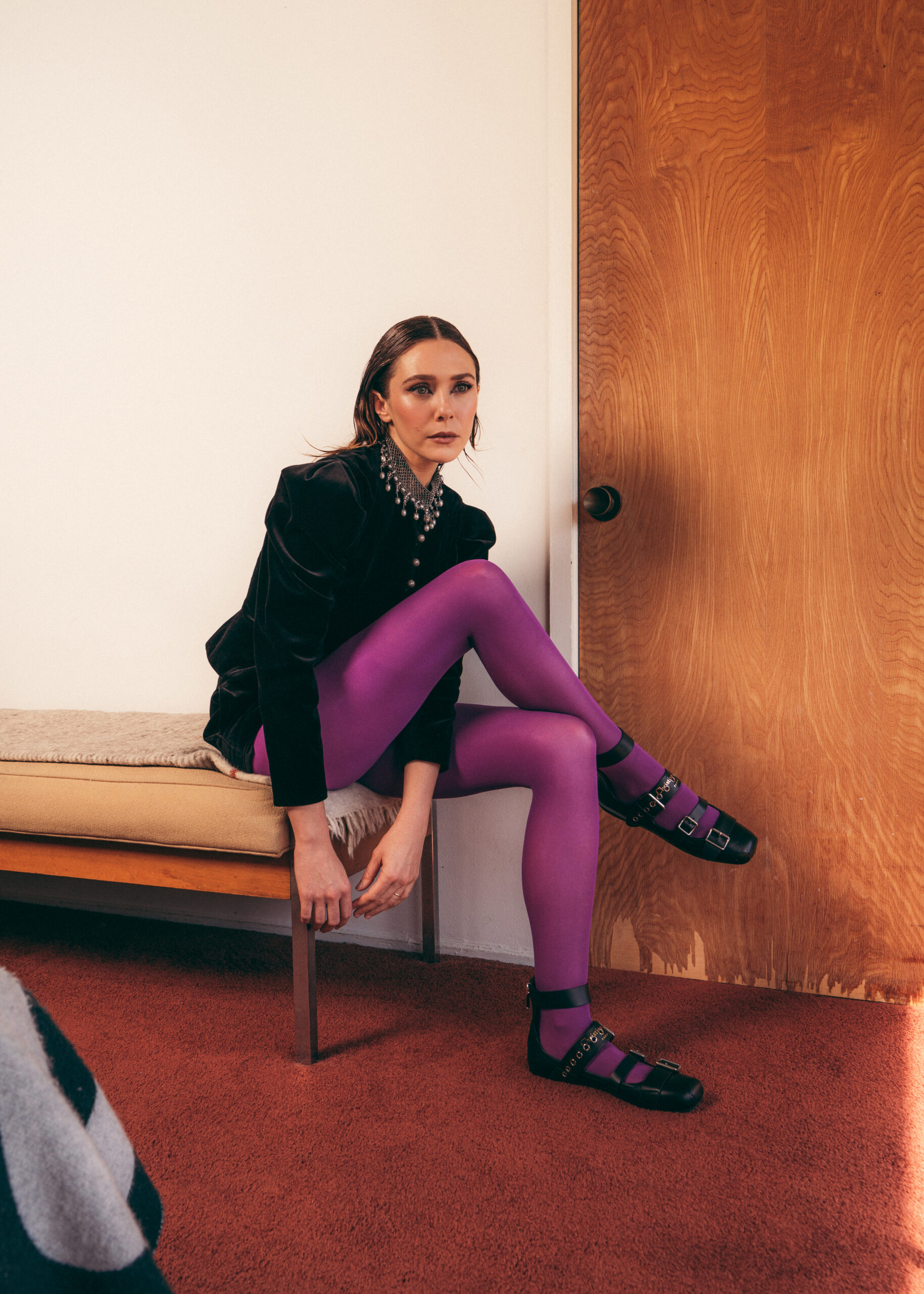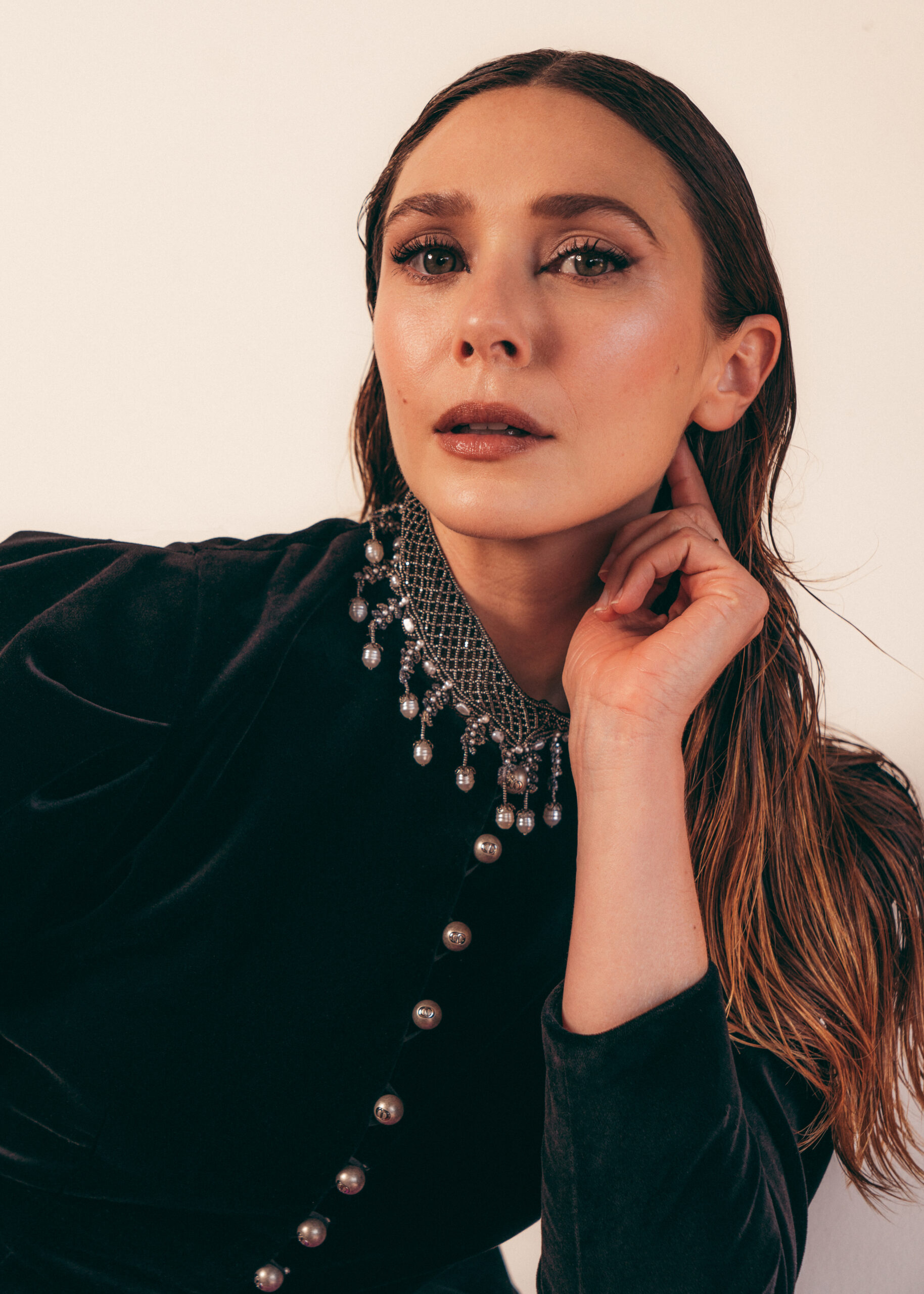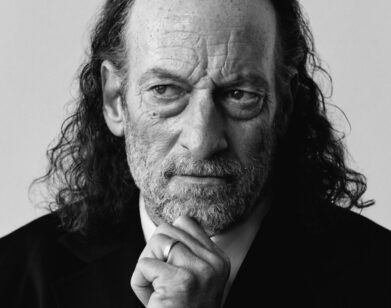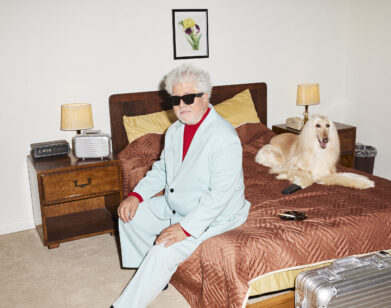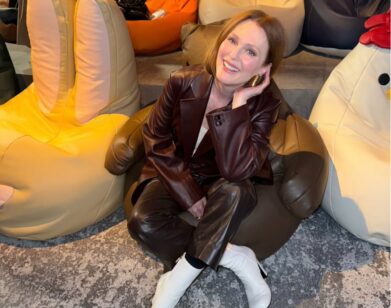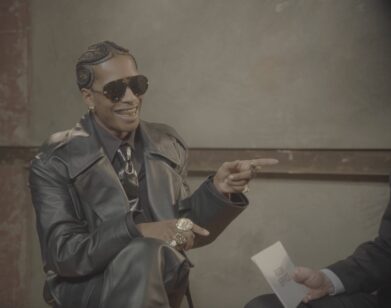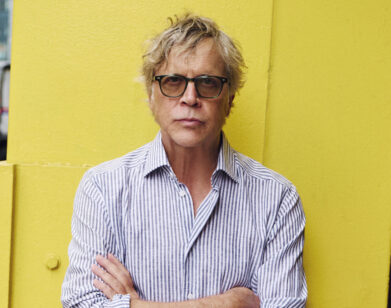IN CONVERSATION
Elizabeth Olsen and Callum Turner on Siblings, Letterboxd, and the State of Indie Film
Last month, when Elizabeth Olsen got on Zoom with her friend and soon-to-be Eternity co-star Callum Turner, she’d just taken the morning flight from London to New York. “They call that the CEO flight,” Turner joked. “Because you wake up, get on the plane, do your work, then you’re in London and you have dinner and you go to bed.” Olsen, in fact, was in London to promote her latest film His Three Daughters, a wrenching and deceptively small family drama written and directed by Azazel Jacobs, who hand-delivered the movie’s melodic script to its three stars, Olsen, Carrie Coon, and Natasha Lyonne. The trio hadn’t met prior to filming, but an abbreviated production schedule —and the demands of a script that called for extreme intimacy—allowed them to fast-track their chemistry. “Carrie and I shared a two-bedroom apartment instead of a trailer because we had no money to make this movie,” explained the WandaVision star. “All three of us came out super honest and vulnerable knowing we only had three weeks to shoot this thing.” The result is one the year’s most touching and well-acted films, following the sisters as they convene in New York at the bitter end of their father’s life. When Olsen and Turner got together to discuss the film, the conversation naturally touched on sibling dynamics, the state of independent film, and their favorite directors, from Todd Haynes to Catherine Breillat.
———
ELIZABETH OLSEN: Hi.
CALLUM TURNER: How are you? How’s your jet lag?
OLSEN: I took the morning flight from New York. Have you ever done that one?
TURNER: They call that the CEO flight or something, don’t they?
OLSEN: No one’s told me that
TURNER: Because you wake up, get on the plane, do your work, then you’re in London and you have dinner and you go to bed.
OLSEN: That’s exactly what I did.
TURNER: You’re the CEO.
OLSEN: Where are you?
TURNER: I’m at home. I really want to talk about your film.
OLSEN: You got to see it? You’ve been really busy and I feel bad that you were forced to watch a movie.
TURNER: No, I really loved watching it. I thought the performances between all three of you were really spellbinding, actually. And I loved your character because you were sort of in between the crazy sister and the really uptight sister. How did you guys develop that relationship? Were there rehearsals?
OLSEN: We had rehearsals. We had three or four days or something of us going through this script and getting to know one another because none of us had met before, even though Aza [Jacobs] wrote it for the three of us.
TURNER: Oh, he wrote it specifically for you three?
OLSEN: Yeah. He and I worked with each other on a show I did for Facebook that no one saw because it was on Facebook, but we had some special directors on it. So he and I have tried to collaborate on other things before and stayed friends and he wrote this in a few days and then wanted to hand-deliver me a hard-copy. There was never a digital copy of the script, except for him.
TURNER: And why was that?
OLSEN: I think he wanted a return to form for him. When he started working, it was about 30 years ago, and he wanted it to feel like it was this thing we did in secret without any announcements. He already knew the money he had based on three financiers that he’s worked with before. And then he knew Carrie [Coon] because he had worked with her husband, Tracy Letts, the playwright and actor.
TURNER: He’s about to play my dad in something.
OLSEN: Stop it.
TURNER: Yeah.
OLSEN: No way.
TURNER: Yeah. I just met him the other day. I didn’t realize that they were married.
OLSEN: It’s crazy. He’s lovely. And Carrie couldn’t be lovelier, and they’re both so smart. And to be clear, I’ve never met Tracy in person. We just called him all the time while we were filming.
TURNER: Would you be on set and say, “Should we call Tracy?”
OLSEN: Carrie and I shared a two-bedroom apartment instead of a trailer because we had no money to make this movie, so we would call him when we were trying to figure out the word puzzles that we played all day long. Spelling Bee is my thing because of these women.
TURNER: This is how you got into Spelling Bee?
OLSEN: Yes.
TURNER: Tell me about that.
OLSEN: Have you met Natasha [Lyonne]?
TURNER: I think once, in passing.
OLSEN: She was probably just screaming at you or something.
TURNER: [Laughs] Yeah.
OLSEN: Aza hardly knew Natasha, but knew Carrie and I well. He just was bold enough to be like, “Natasha, I wrote this for you.” And he hand-delivered it to all three of us, and that was it. There was no announcement. There was no scrambling for money. It just was what it was. And we all said, “Yes, we’ll try to make the schedule work for the three of us.” So he wanted to shoot on 35 millimeter [film]. He wanted to edit it himself for the first time in like, 25 years or whatever. We all kind of showed up and it felt like a home movie. We literally met during those few days of rehearsal. All three of us came out super honest and vulnerable knowing we only had three weeks to shoot this thing. Vulnerable is a dumb word, but we were just like, “Let’s figure out how to meet each other really quickly.” We became kind of obsessed with one another, and I think we were all excited to just do a movie that was small, with other women and with Aza. It wasn’t for anyone.
TURNER: Yeah, like when you go and do something and you create a family and it feels isolated and you’re just doing it for the love of it, because you truly enjoy it and you’re digging and hoping to find something deeper.
OLSEN: Totally, and without any expectation that it will ever be released or seen by anyone.
TURNER: I think that’s probably always the best way.
OLSEN: It’s hard to return to that, I think.
TURNER: Yeah, it is.
OLSEN: I was with someone yesterday. “With someone”—I had a greeter at the airport. I don’t want it to sound that glamorous, but he was like, “What’s your favorite movie you’ve done?” And I was like, “I don’t know.” I feel like all my favorite movies are the ones I’ve done that I haven’t shared with anyone because they’re not tainted by anyone else’s thoughts or feelings or experiences. They’re still mine. Like, I couldn’t in retrospect say that was my favorite thing I’ve done, because other people put their thoughts on it.
TURNER: And also, the experience is always different. You learn different lessons as you go along, and they’re always as vital as the last. Unless you have a bad time on the movie, really,
OLSEN: But even if you have a bad time, I feel like you could objectively watch it and be like, “Oh shit, that was really good.”
TURNER: I did a movie where I had a bad time and I didn’t watch it. I’m never going to watch it, actually.
OLSEN: Because it brings up too much personal trauma?
TURNER: I just want to forget about it and move on. I’ve made some bad choices along the way. But that’s part of being human, right?
OLSEN: Or you think you’re making a good one and it turns out bad, and then you try and figure it out like, “Why did I think that recipe would work? And how does it inform the next one?”
TURNER: And I guess that’s what we’re talking about anyway, that evolution as an artist and as a person. There is no bad experience. It’s just an experience you’re going to grow from.
OLSEN: Yeah. I mean, I’m trying to think if I’ve learned from all my bad experiences or if the thing you learn is just to not work with that person again.
TURNER: Yeah, not going to go there again. I really love the way that you guys built your relationship. And I was thinking about that bit when the dad eventually wakes up.
OLSEN: Spoiler alert!
TURNER: Spoiler alert. And you just said that Aza wrote it in three days?
OLSEN: Yeah, he wrote it in—I don’t know how many days, I don’t speak for him—but I know it came to him really quickly. It was a very fast write. But he knew where he was starting, and he didn’t know where he was going.
TURNER: There’s this really poetic and heartfelt speech, and then the way that it’s cut, I thought to myself, “Was that a dream sequence? Was that something that all three sisters had wished to happen, that he’d wake up and they’d have one last moment with him?”
OLSEN: I mean, it definitely is unanswered. You’ll never know what it is, but I think of it as when someone’s dying and you have these fantasies of what you wish you could say to them, wanting to be seen by someone in your family and feeling unseen. Since I was a little kid and until what was probably an abnormally old age, I would play these make-believe conversations out loud. And it wasn’t until I was in theater school in my third year that I was doing this improv scenario and I leaned over to a buddy of mine and was like, “I feel like I do this every day in my apartment.” And he was like, “Lizzie, that’s called insanity.”
TURNER: Other people would say that’s manifestation, right? If you’re trying to bring things in.
OLSEN: Sure. That’s funny.
TURNER: Did you guys improvise a lot on this?
OLSEN: No, we stuck to even the pauses and the ellipses and interruptions and all of that.
TURNER: It’s so beautifully written.
OLSEN: It’s been a while since I’ve worked on something where the language was that specific. [Phone rings] Why is someone calling me?
TURNER: Got a phone call.
OLSEN: Well, they hung up.
TURNER: Not today!
OLSEN: It was really fun. It’s been a long time since I’ve memorized pages of a monologue or phone calls. The prep was just so fun, trying to honor the rhythm that he wrote. And that was really important in the rehearsals: the rhythm, and getting inside Aza’s brain because it almost felt like he already had it musically structured in his head, how he wanted everything to flow within the page. And it was nice to shoot on film and have these limitations. For instance, we had very few source lights.
TURNER: Limitations can actually create a style, create an aesthetic, create a feeling that’s really—
OLSEN: They’re my favorite.
TURNER: Yeah. There’s a film called Dead Man’s Shoes, a Shane Meadows movie. Did you see that one?
OLSEN: No.
TURNER: It’s Paddy Considine and Toby Kebbell, it’s a beautiful movie. But it’s so low budget that everyone’s got to have the same costumes and fit into two minivans. And they only shot in three locations. So these limitations create this claustrophobic feeling and this tension. I think you and Robbie [Arnett, Olsen’s husband] would love that movie.
OLSEN: I just put it on my phone. I’ll add it to my album of movies to watch.
TURNER: You’re an avid watcher. You and Robbie watch movies all the time, right?
OLSEN: We do, but it’s a bottomless well. I had to start writing a list of the movies we have watched because it just becomes a jumbled mess in my brain to make sure I have everything.
TURNER: Are you organized like that?
OLSEN: No. I am truly, actually brain-dead and the only way for me to remember anything is to write it down. I feel like my brain’s constantly trying to compensate for what’s in there and emptying out stuff that’s useless so that I can store up things that are of more use to me. I just feel like it’s only downhill from here, so I really need to make an effort.
TURNER: Yeah, I’m the same. I kind of just do “thumbs up” or “thumbs down” or “nicely shot, well-acted,” then I forget about it.
OLSEN: Do you have a Letterboxd?
TURNER: No. But when I was 18 or 19, I did have a book where I’d log movies and I’d give them a rating out of five stars and write a little note. But I think I only did that for maybe 20 films before I gave up. I’m not good at diaries or anything.
OLSEN: I started journaling a couple of years ago.
TURNER: Yeah?
OLSEN: It’s been helpful for my brain.
TURNER: What does it do for your brain?
OLSEN: It was really useful when we were shooting. I actually had multiple revelations while writing in my little journal.
TURNER: On set?
OLSEN: No, I do it in the morning before work. Even if pick up is at 4:30, I still make sure I have 15 minutes to do it while my coffee is brewing.
TURNER: So, I’m curious how you built the relationships. Because I did really love that—the different characteristics and the character types between the three of you. Was that so specifically in the script?
OLSEN: Yeah, it’s really specific in the script. I mean, both of them are such great actors that there’s not much heavy lifting. We all shared the burden, but it was really on the page. And I think the hardest part for me was being between them, all the ping-ponging, because there wasn’t really a clear or obvious arc to me of where you start and where you end because it’s not that kind of film either.
TURNER: But you definitely had the hardest part to navigate. In certain moments, it felt like you were going to let loose and be free, but you’re also constrained by being a mother and all [the character’s] responsibilities.
OLSEN: I felt frustrated that I couldn’t have a turning point moment or something, that it really was just more this up and down, up and down, then making a choice where she ends up being different than where she started in her relationships.
TURNER: That’s what makes the performance really beautiful and nuanced. It reminds me of Anthony Hopkins in The Remains of the Day. Have you seen that movie?
OLSEN: No. [Laughs] But I’ve never been compared to Anthony Hopkins before and I’m really flattered.
TURNER: He plays a butler in a stately home and you can see that there’s a person inside, but he’s constrained by his job and he’s become his job. And Emma Thompson is his love interest, but he can’t let himself go. And it reminded me of your character. You are the youngest, right?
OLSEN: Mm-hmm. The first time I read it I remember thinking, “Oh, this sister dynamic, I don’t know…” It felt challenging to do something really familiar. Sometimes, when you’re doing something, you’re activated by what’s on the page and the people you’re working with and the process of bouncing off one another that you almost forget directly what in your life you are drawing from. Sometimes I use it to open something up, but it was all just kind of there. Relationships between siblings are so complicated. And there’s this constant battle of, “The way you see me isn’t how I see myself, but because you see me that way and we have to be together, it’s so much easier to be the thing you see me as than to be the person who I am in every other aspect of my life.” And I do believe that that is where all three of these sisters start, at least until they learn from the experience as little or as much as they do.
TURNER: Well, it’s also perception, isn’t it? I grew up as an only child, but I have a half-brother and half-sister and they grew up in Australia. And it really made me think about my perception of their lives when they were kids versus [my perception] now. I wonder where the sisters are going to end up in their relationships with each other.
OLSEN: I never think about what’s next. There’s something that Sean Durkin said when we were doing press for Martha Marcy May Marlene because everyone wanted to ask, “What do you think happened next?” And he said, “I believe a film begins and ends at a very specific place that was chosen to tell that story. And what happens on either end of that is for everyone else to interpret.”
TURNER: Until the sequel.
OLSEN: Until the sequel.
TURNER: And then the third one.
OLSEN: For whatever reason, I just kind of allow my brain to stop there unless it’s necessary for the story on the page.
TURNER: Yeah, totally. But I want them to be friends. I want them to be able to spend time with each other. But maybe life gets in the way and they don’t.
OLSEN: I think that’s what’s interesting about dealing with a death. Sometimes it brings people together and creates a history, but sometimes things are just written in stone. That’s a bleak way to end this interview, huh?
TURNER: Jesus Christ.
OLSEN: I don’t know.
TURNER: No, but it’s true. You have to nurture relationships. Even with your friends, you have to nurture and tend to relationships like a gardener.
OLSEN: Anyway, what are you doing next? Are you going to work? Are you taking time off?
TURNER: I’m going to work.
OLSEN: Are you going to Japan?
TURNER: I’m going to Japan in December for a TV show called Neuromancer and I’m going to do this movie called Rosebush Pruning with a director called Karim Aïnouz who just did Firebrand.
OLSEN: Oh, yeah. Did you go see Firebrand yet?
TURNER: I’m going to go see it tomorrow.
OLSEN: Is it in theaters?
TURNER: Yeah.
OLSEN: I’ve been seeing so many movies recently. Did you see Kneecap?
TURNER: No, I didn’t. But I saw Longlegs. What’s Kneecap?
OLSEN: Kneecap is—
TURNER: Is it horror?
OLSEN: No, it’s like Irish rap.
TURNER: Oh, yeah. It’s that Irish-language movie. Why are you in London, by the way?
OLSEN: I’m in London doing press for this movie. And then I go to New York for press and then Toronto for the movie I did with Alicia [Vikander] and Himesh [Patel] called Assessment. And then I’ll never work again because no one is giving any movie to the movies I want to do. No one’s giving money to independent films in the United States. You’ve got to film them in Germany.
TURNER: Yeah, in Hamburg. You know what movie I watched that I can recommend? The Todd Haynes movie, you’ve probably already seen it.
OLSEN: Which one? Safe?
TURNER: Unreal.
OLSEN: It’s one of the best movies ever.
TURNER: I thought Julianne Moore was just unbelievable.
OLSEN: I know. It’s impossible for that movie to leave your whole body. It’s so good. It’s a constant reference for so many things for me. There’s actually a choice she made where she never wanted her voice to ever have any resonance. I’ve watched interviews about her talking about this like a freak. She never wanted her voice to ever resonate in her throat or her chest, which just helped her be so small and voiceless. It was such a smart performance.
TURNER: So that’s not on your list of movies to watch. [Laughs]
OLSEN: No, it’s not. Did you see Fat Girl?
TURNER: What is Fat Girl?
OLSEN: It’s a French film by Catherine Breillat. Based on the conversations we’ve had about films in the past, I feel like that’s one you may be rocked by.
TURNER: I’m going to watch that.
OLSEN: Thanks for chatting with me when you have no time.
TURNER: Of course.
———
Hair: Adir Abergel
Makeup: Pati Dubroff


